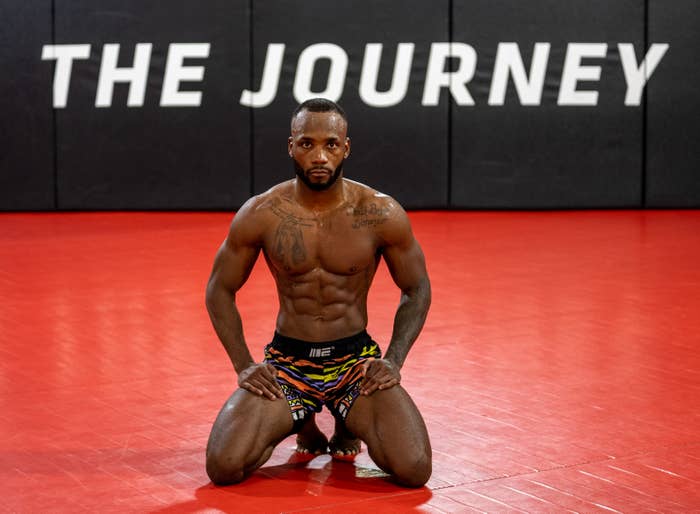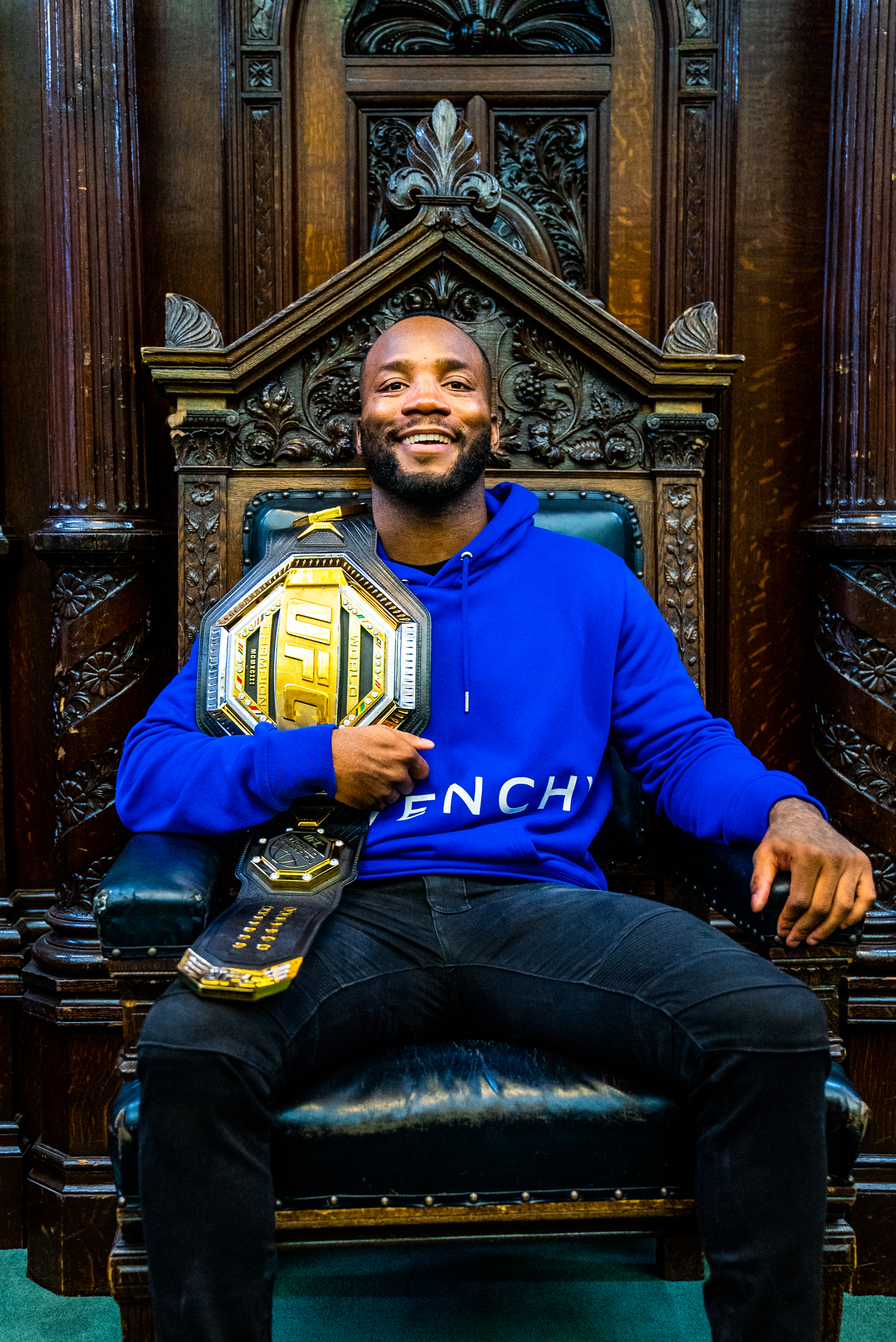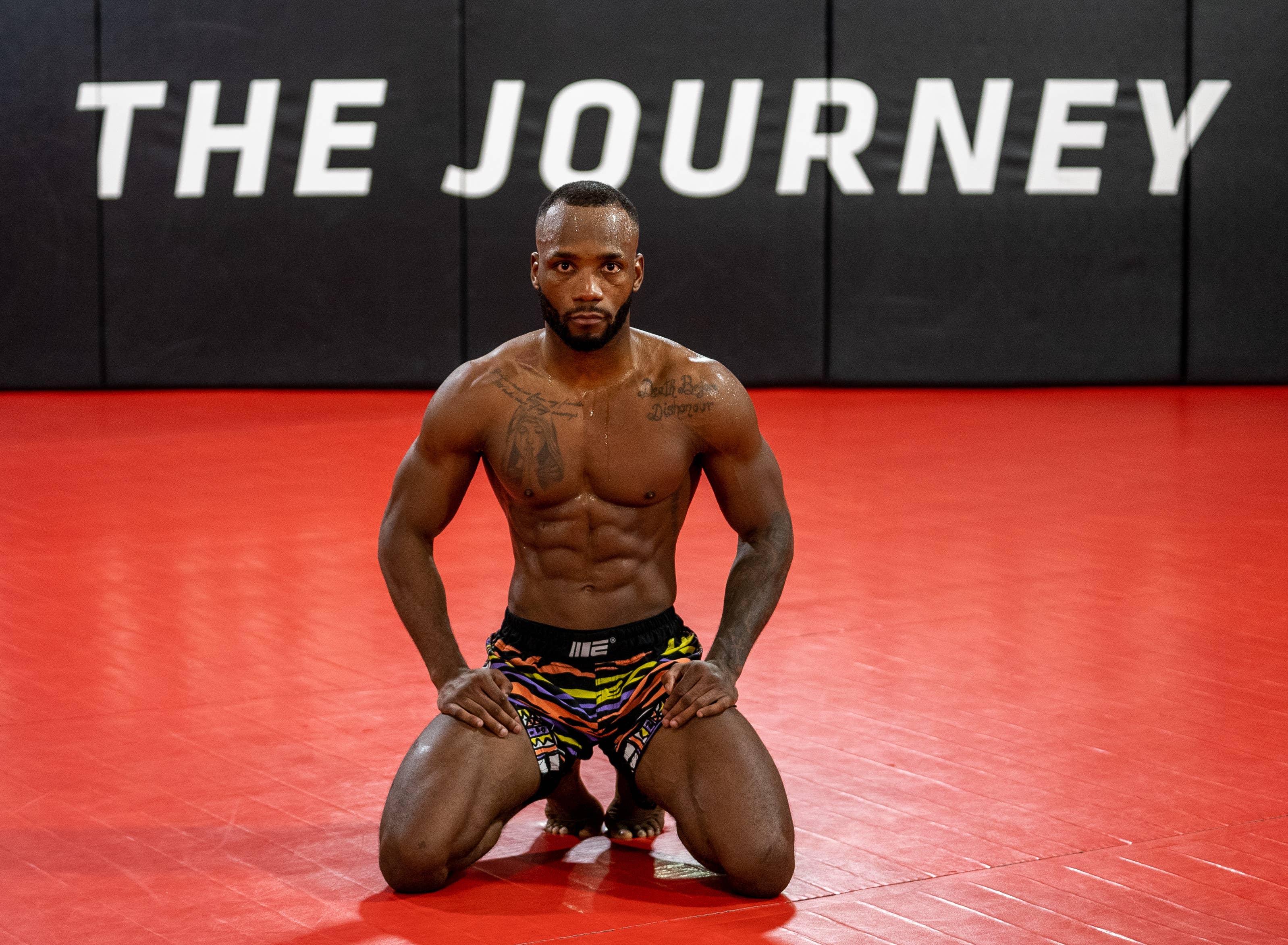
Headshot! Bang! Done. A feint, a leading backhand, and one swift headkick placed the UFC Welterweight Championship belt on the waist of Birmingham’s Leon Edwards on August 21, 2022.
The 31-year-old MMA star astonished the fighting world with a heroic comeback in his rematch with Kamaru Usman—seven years on from their first bout, in which the former champion came out on top. The Jamaican-born talent’s seven-year journey from the first to second bout with Mr. Usman was afflicted by a spread of untimely events—including delays to fights, injuries to would-be opponents, an eight-fight win streak ended by a no-contest bout with Belal Muhammad, and not least the ramifications of COVID-19. All of this would leave his rematch and title dreams up in the air, unable to see the clear route to where he deserved to be.
But he persevered, training non-stop to be in the best condition he could be in. “Leading into the second fight, I was solid—mentally,” he explains. “I knew what I needed to do to win. I knew how to approach it. That would’ve been my fifth main event for the UFC. Even though it was a longer road to get to that point of fighting for the title—because of the ups and downs I went through in my career—looking back now, it was a blessing in disguise. It gave me time to improve, build my foundation, fortify my skill-sets, and my mental state.” Recognised as a main eventer, collecting wins against UFC veterans like Donald Cerrone, Gunnar Nelson and Nate Diaz, Leon Edwards’ rematch with Kamaru Usman became a possibility again. At UFC 278, the fight would take place, with a rejuvenated Leon stepping into the Octagon with not something to prove, but something to show.
We caught up with the newly-crowned Champ to expose the workings of his mentality heading into the second fight, as well as the history behind his endeavours into MMA and his immediate fighting future.
“I don’t have to look over my back now—I get to travel the world, meet new people, and all through doing the job that I love.”
COMPLEX: Considering where you’ve come from, and the pressures of a young man living a life dictated by the codes of the roads, how do you see the contrast of pressures you experienced then with the pressure of being a UFC fighter at the top of his game now?
Leon Edwards: It’s two different pressures. Different expectations from my family… I always wanted my family to be in a better position, and I’m able to make that happen for them now. Back in the day, there was a small-minded way of thinking when I was on road. I thought the roads was life—and that was it! It was the pinnacle of life.
When did you realise that you were destined for more than that? I ask that thinking of those who are in a similar position and perhaps want to make a transition into the fighting world, or sports in general.
I got into MMA for my mum; she asked me to go to the gym and just do something for her to make her proud. Then I realised, nobody wins on road. I don’t know anyone that’s won. I know man that have done bits and moved to other countries. I know man that are doing life, caught bodies, but there’s no wins. Short-term wins, yeah—you make a little change here and there—but long-term wins? I want long-term wins, and I realised that MMA could give me that. I don’t have to look over my back now—I get travel the world, meet knew people, and all from doing the job that I love. Financially, I’m good enough that I can look after my family too. Gangbanging, postcodes, blah, blah, blah. There’s nothing there! I used MMA to change my mind, but it doesn’t have to be MMA. You can still use the same discipline and focus that I used in MMA to go into whatever you want to go into—writing, music, whatever. Dedicate yourself to it and put your time into it. I stopped hanging out on road and stayed in the gym, from morning till night, training, training, training. I went through years without getting paid because I had the vision. It is easier said than done, but anything you want to do in life, make a plan, write it down in a book, and say, “Listen! This is what I am doing and nobody’s getting me off my path.” That’s the only way you can change your life: by actively changing it. Dedicate yourself full-time to it, research it, watch it, study it, and it will happen.
For me, there’s such a thing as an aura of a champion. I wonder, how has your day-to-day life changed?
I wouldn’t say it’s changed massively. Obviously, more people notice you, you get more shit for free, more media, but for my day-to-day life, I’m still simple. I’m still doing my thing, still with my family and my son. Financially, though, it has changed. I think, for me, my rise was gradual—it wasn’t overnight. It’s been about 7-8 years in the works. This is my eleventh fight that I’ve won in a row for the UFC. When I first started off, you would’ve had one-word answers from me [laughs]. I still had that road mentality to things, you get me? But now, I’m able to share my story and talk. I’m more comfortable now.
What was your mentality going into your second fight with Kamaru Usman?
I’ll go through the first fight: so, the first fight—by then, I’d been doing MMA for four years. Kamaru was doing it for a similar time, but he did college wrestling in the States so he was already seasoned in the wrestling part of the game. I remember when my coaches, back then—I’ve got different coaches now—they were telling me I needed to move to America to improve my wrestling to compete against him, basically. So I left Birmingham and I went to AKA in California to train for that fight. I just didn’t feel myself. The camp was focused more on defending, worried about what he’s going to do to me more than what I needed to do to him, to win. And I think it showed in the first fight, so I lost that one by decision.
The second fight—after seven years of winning, I haven’t lost since I last fought him. I came back to Birmingham, restructured my team, got the right people on board, and I haven’t lost since. Leading into the second fight, I was solid—mentally. I knew what I needed to do to win. I knew how to approach it. That would’ve been my fifth main event for the UFC. Even though it was a longer road to get to that point of fighting for the title—because of the ups and downs I went through in my career—looking back now, it was a blessing in disguise. It gave me time to improve, build my foundation, fortify my skill-sets, and my mental state. I was supposed to fight Tyron Woodley, but it got cancelled a week before due to Covid. Those two years, man…
—two years cut from our lives.
Bare cancellations of fights. Everyone was like, “You’re unlucky, blah, blah, blah.” But for me, my mental frame, I had to stop moaning and saying, “Why me?” After a week or two, I thought, “What can I do now to come out of this situation?” Show up to the gym. Control what I can control, improve, get better. When it comes time for me to get my opportunity that I deserve, I’ll be ready for it. But until then, I’ll use this time to improve myself, and get better physically and mentally.
“If I can share my story and it helps one or two people, then I’ll happy. It would be selfish of me to get to this position and be like, ‘You man figure it out for yourselves.’”



